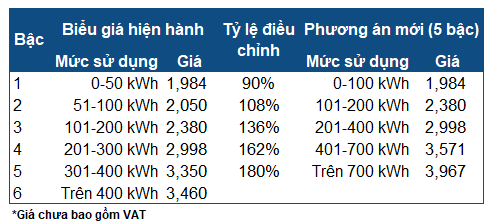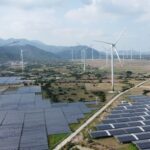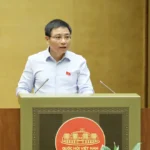This decision regulates the retail electricity price structure, appropriate electricity pricing mechanisms for different consumer groups, and financial support for electricity used for household purposes by poor and socially disadvantaged households. It also sets out the electricity prices in rural, mountainous, border, and island areas that are not yet connected to the national grid.
The decision details the retail electricity prices for different consumer groups, including production, business, administrative, and household use. The prices for household consumers will now be based on a five-tier structure (currently six tiers) with incremental rates to encourage efficient and economical electricity use. The first tier, ranging from 0 to 100 kWh, is set at 90% of the average retail electricity price of 2,204.0655 VND/kWh. The second tier, from 101 to 200 kWh, is 108%, the third tier from 201 to 400 kWh is 136%, the fourth tier from 401 to 700 kWh is 162%, and the fifth tier, above 700 kWh, is 180%.
As a result, customers who consume more than 700 kWh will be charged 3,967 VND/kWh, excluding VAT. On May 10, 2025, EVN increased the retail electricity price from 2,103.11 VND/kWh to 2,204.0655 VND/kWh. With the possibility of price adjustments every three months, EVN may apply this new pricing structure from August 2025.
|
Electricity Price Table for the Five-Tier Structure (in VND)
|
The national grid’s electricity prices will be applied to consumers in rural, mountainous, border, and island areas that are not yet connected.
The difference between the cost of electricity for power companies when applying a unified national price and the cost of electricity production and trading will be included in the overall national electricity price for areas where the Vietnam Electricity Group (EVN) sells electricity. For areas where EVN is not the seller, the difference in costs will be implemented according to the Prime Minister’s regulations.
In cases where technical conditions permit, the Prime Minister’s regulations will determine the multi-component retail electricity prices applicable to different consumer groups.
Financial Support for Electricity Bills
According to the decision, poor households as defined by relevant legal regulations will receive financial support for their household electricity consumption. The monthly support will be equivalent to the cost of 30 kWh of electricity, calculated based on the current first-tier household electricity price. Socially disadvantaged households, as defined by the Prime Minister and with monthly electricity consumption not exceeding 50 kWh, will receive support equivalent to the cost of 30 kWh, calculated at the first-tier household electricity price.
The financial support for poor and socially disadvantaged households will be funded by the state budget and other legal financial sources according to the law. The central budget will support localities in implementing this social security policy, with the specific amount decided by the competent authority for each period.
The Ministry of Industry and Trade is responsible for regulating and guiding the implementation of retail electricity prices for different consumer groups and electricity retailers. The Minister of Industry and Trade will decide on the peak, off-peak, and regular hours applicable to the power system in each stage through administrative documents.
– 10:19 31/05/2025
The Ultimate Heavyweight: 110-Ton Behemoth Successfully Installed, $390 Million Project Racing Towards Completion
The contractors are pulling out all the stops to stay on track and are striving to complete the entire project by 2025. With their unwavering dedication and expertise, they are leaving no stone unturned to meet this ambitious deadline.
The Renewables Rush: A Race Against Time for Ninh Thuan’s Green Energy Projects
The renewable energy projects in Ninh Thuan are facing delays due to challenges with electricity pricing frameworks and land clearance procedures. These obstacles have hindered the timely progress of these initiatives, underscoring the need for streamlined processes to facilitate the development of sustainable energy sources in the region.
“Unleashing Private Sector Growth: A Special Policy Initiative by the Legislature”
On Saturday, at 11 am, the National Assembly is expected to pass a resolution on special mechanisms and policies to promote the private economy.






















